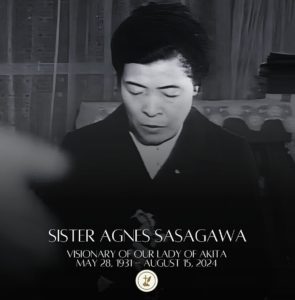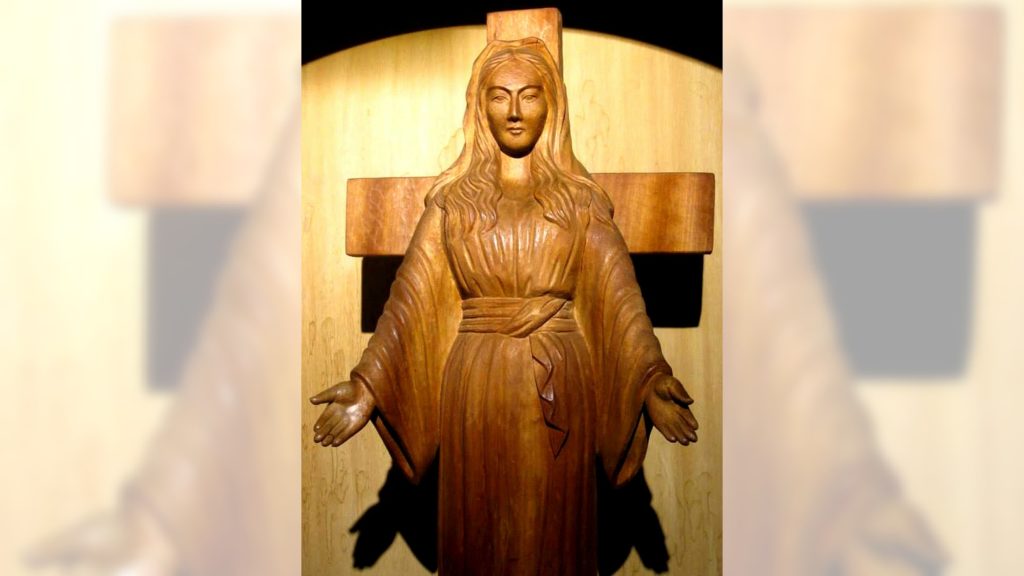Sister Agnes Sasagawa, a Japanese nun whose purported visions of the Virgin Mary under the title of Our Lady of Akita included stark warnings for humanity and instructions to pray the rosary and repent of sin, died Aug. 15 at age 93.
A parish priest in Akita, Japan, confirmed to CNA by phone that Sasagawa had died on Aug. 15.
The order to which Sasagawa belonged, the Institute of the Handmaids of the Holy Eucharist, announced that Sasagawa, who had been “undergoing medical treatment for some time,” died on the feast of the Assumption of Mary. She famously received a purported series of messages from Mary and witnessed other supernatural phenomena beginning 50 years ago.
The local bishop, John Shojiro Ito of Niigata, who founded Sasagawa’s order and died in 1993, gave the faithful in his diocese permission to venerate Our Lady of Akita in April 1984 after eight years of investigation, finding that her messages contain “nothing contrary to Catholic doctrine or morals.”
Katsuko Sasagawa, born in 1930 to a Buddhist family, was baptized after the witness of a Christian nurse who gave her water from Lourdes to drink. She joined religious life and took the name Agnes.
Sasagawa’s unusual spiritual experiences began in 1973 while she was still very new to the religious community.
On June 12, 1973, Sasagawa saw brilliant rays coming from the tabernacle at the convent. The vision happened again on each of the following two days. Then, on June 28, a painful cross-shaped wound, which bled profusely, appeared on Sasagawa’s hand.
On July 6, Sasagawa heard a voice coming from a wooden statue of Mary that was in the convent, which had been carved from a single block of wood a decade prior. The voice told her that issues she was having at the time with her hearing would be healed (which came to pass in 1974) and also that she should “pray in reparation for the sins of men.” The voice also taught her a prayer of consecration to Jesus’ heart.
Soon after, the statue of Mary developed a wound similar to Sasagawa’s, but on the opposite hand. Sasagawa’s wound eventually vanished.

On Aug. 3, 1973, Mary spoke to Sasagawa again, speaking of an “important” message that Sasagawa should convey to her superior.
“Many men in this world afflict the Lord. I desire souls to console him to soften the anger of the Heavenly Father. I wish, with my Son, for souls who will repair by their suffering and their poverty for the sinners and ingrates. In order that the world might know his anger, the Heavenly Father is preparing to inflict a great chastisement on all mankind,” Mary is purported to have told Sasagawa.
“With my Son I have intervened so many times to appease the wrath of the Father. I have prevented the coming of calamities by offering him the sufferings of the Son on the cross, his precious blood, and beloved souls who console him forming a cohort of victim souls. Prayer, penance, and courageous sacrifices can soften the Father’s anger. I desire this also from your community ... that it love poverty, that it sanctify itself and pray in reparation for the ingratitude and outrages of so many men.”
Mary then reportedly told Sasagawa to “recite the prayer of the Handmaids of the Eucharist with awareness of its meaning; put it into practice; offer in reparation (whatever God may send) for sins. Let each one endeavor, according to capacity and position, to offer herself entirely to the Lord.”
Sasagawa’s second message from Mary came on Oct. 13, 1973, the anniversary of Mary’s appearance at Fatima.
“As I told you, if men do not repent and better themselves, the Father will inflict a terrible punishment on all humanity. It will be a punishment greater than the deluge, such as one has never seen before. Fire will fall from the sky and will wipe out a great part of humanity, the good as well as the bad, sparing neither priests nor faithful. The survivors will find themselves so desolate that they will envy the dead. The only arms which will remain for you will be the rosary and the sign left by my Son. Each day recite the prayers of the rosary. With the rosary, pray for the pope, the bishops, and priests,” Mary said.
“The work of the devil will infiltrate even into the Church in such a way that one will see cardinals opposing cardinals, bishops against bishops. The priests who venerate me will be scorned and opposed by their confreres ... churches and altars sacked; the Church will be full of those who accept compromises, and the demon will press many priests and consecrated souls to leave the service of the Lord. The demon will be especially implacable against souls consecrated to God. The thought of the loss of so many souls is the cause of my sadness. If sins increase in number and gravity, there will be no longer pardon for them.”
In January 1975, almost two years later, the statue of Mary began to weep — continuing to do so on 101 occasions over the next seven years. A Japanese television station reportedly captured the weeping — known as “lacrimations” — on film.
In an April 22, 1984, letter, Bishop Ito recognized “the supernatural character of a series of mysterious events concerning the statue of the Holy Mother Mary.”
“Consequently, I authorize, throughout the entire diocese, the veneration of the Holy Mother of Akita, while awaiting that the Holy See publishes definitive judgment on this matter,” the bishop wrote.
“And I ask that it be remembered that even if the Holy See later publishes a favorable judgment with regard to the events of Akita, it is a question only of a private divine revelation. Christians are bound to believe only [the] content of public divine revelation (closed after the death of the last Apostle), which contains all that is necessary for salvation. Nevertheless, the Church, until now, has equally made much of private divine revelations as they fortify the faith.”
A shrine housing the statue and dedicated to Mary under the title of “Redemptorist Mater” (Mother of the Redeemer) was completed in Akita in 2002 and since 2017 has attracted some 7,000 pilgrims a year.
The Vatican, which earlier this year issued new norms mandating that the Vatican’s top doctrinal office “must always be consulted and give final approval” to alleged Marian apparitions, has not officially ruled on Our Lady of Akita. Cardinal Joseph Ratzinger, the future Pope Benedict XVI, in 1988 as prefect of the Dicastery for the Doctrine of the Faith let stand Ito’s judgment that the apparitions and the messages were acceptable for the faithful.
Hannah Brockhaus contributed to this report.

